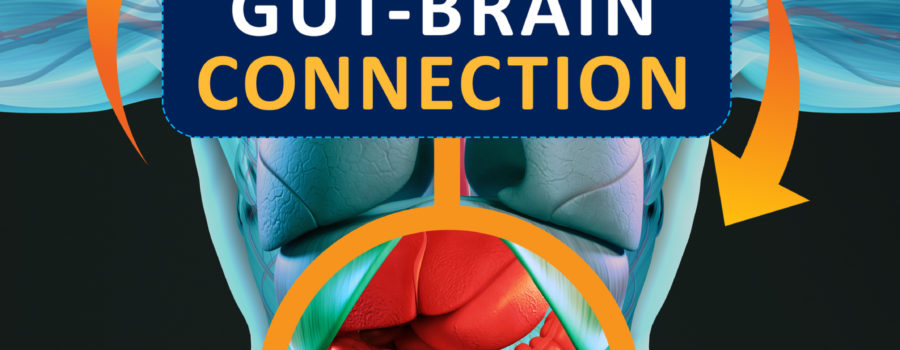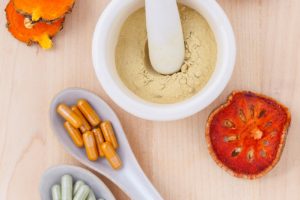Have you ever had “butterflies” in your stomach before a presentation or some other big event? Or have you ever felt brain fog or fuzziness after eating a particular food?
These instances, among many other ones, point to the fact that the gut and brain are connected to one another.
The Gut-Brain Connection
It might just seem coincidental, but make no mistake, the connection between the gut and brain is very real.
In fact, we now know that the gut and brain are inextricably linked by many different mechanisms. Many ancient cultures believed this to be true but had no way of proving it; and even in more recent years, it was hard to prove the hunches we had about the gut and brain being connected. But all of this is now starting to be confirmed by the latest research.
So, not only does this relationship exist, it is actually one of the most important connections in our overall health and well-being. Therefore, it is crucial to understand at least the basics of this connection and how to optimize it.
Bidirectional Relationship
The gut-brain connection (or gut-brain axis) is bidirectional, so the gut can influence the brain and vice versa. Specifically, the gut-brain axis refers to the gastrointestinal tract communicating with the central nervous system as a whole.1

The GI tract contains about 100 trillion bacteria, which are collectively known as your gut microbiota. There are good, bad, and somewhat neutral bacteria, but in order to be healthy, the good bacteria obviously need to outweigh the bad.
Nervous System Components
Now, there are a number of pathways within this gut-brain connection. One of the primary ways these two areas are connected is through the vagus nerve. This large nerve acts as a key bridge between the gut and brain; it runs all the way from the central nervous system to the nervous system in the gut, which is called the enteric nervous system.1,3
Yes, that’s right…the gut has its own nervous system! It is estimated that the enteric nervous system contains 200 to 600 million neurons!3 Fewer neurons than the central nervous system, though it is no doubt still a huge role-player in the nervous system.

So, signals can travel from the brain down the vagus nerve to the gut, and signals can also travel from the gut back up to the brain via the vagus nerve as well!
Vagal Tone and Nervous System Health
This is why you need to be sending the right signals from the gut to the brain and vice versa. And this is ultimately done through a healthy diet and lifestyle. Poor diet, chronic stress, and so forth, disrupt the gut and the brain, thus the signals being sent along the vagus nerve are suboptimal, which leads to poorer vagal tone and suboptimal health.
(Vagal tone is a measure of how well the vagus nerve is activated and is related to how well the body can react and respond to stress, among other nervous system components. You want to have a higher vagal tone, meaning that the body can more easily turn on its parasympathetic nervous system and deal with stress.)
Neurotransmitter Production

The gut and brain also have important connections with regard to neurotransmitter production. The gut produces the vast majority of the body’s serotonin, along with some of the body’s dopamine, GABA, and other neurotransmitters!4 The many bacteria living in the gut also have receptors for various transmitters and other chemical compounds. All of this, combined with the fact that it has so many neurons, is why the gut is often called the “second brain”.
So, the health status of the gut can influence brain function by determining to some degree the number of neurotransmitters that are produced and activated. And this is often determined by the number of healthy bacteria living in the gut.1,2 Thus, you can see the specific connections between gut health and brain function.
On the flip side, mental states can influence gut health too. And since mental states are to some degree determined by neurotransmitter levels, you can see the sort of “triadic” relationship between gut health, neurotransmitter levels, and mental health, all influencing each other.4
Interactions in the Stress Response

The gut-brain connection is also highly relevant when dealing with stress. Stress and anxiety can cause disruptions in gut microbiota which further increase the risk for gut problems and mental problems, thus creating a vicious cycle.4
This is also evident in the HPA axis, which is the body’s primary stress response system. Mainly, microbiota influence HPA activation in response to stress. The gut microbiome sends signals via the vagus nerve to the hypothalamus, hippocampus, and other higher brain areas, which ultimately leads to HPA-axis activation.2,4 In turn, this affects cortisol production and other stress-response mechanisms.2,4
So, without a healthy gut microbiome, you are more likely to experience increased stress levels and exaggerated responses to stressors. Essentially, the HPA-axis could become activated too often and in situations where it really doesn’t need to; it becomes hyperactivated. And this could potentially lead to chronic stress if left unchecked.
Immune System Mechanisms
The immune system is an additional key area connecting the gut and brain. This is because gut bacteria have a direct influence on immune and inflammatory processes. In fact, about 80 percent of the immune system resides in the gut.

The gut bacteria play many roles here as well, such as limiting pathogen invasion and priming your immune responses. And overall, they are important for homeostasis (balance in the body) with regard to immune and inflammatory responses.5
Further Immune Roles
Furthermore, the lining of the GI tract creates a barrier so that only the appropriate particles get passed into the bloodstream. If this barrier becomes weakened, however, undigested food particles, toxins, and other things can leach into the bloodstream. This is known as leaky gut syndrome.
Therefore, disruptions in the microbiota and the lining of the gut could lead to overactive immune responses, which could lead to inflammation in the brain and rest of the body.2,4,5
Also, the immune cells of the central nervous system are directly regulated by gut bacteria. So, any disruptions here could lead to neuroinflammation and potentially a wide array of neuropsychiatric problems, such as brain fog, depression, and anxiety.1,5
Optimizing the Gut-Brain Connection Through Diet
As you can see, there are many pathways connecting the gut and brain. The question then remains, what can you do to reestablish health in this connection?

Well, one of the most crucial ways to optimize this relationship is through diet and nutrition. After all, food is clearly the most important factor when we’re talking about the gut; this is why diet is the first course of action.6,7
Specifically, the nutrients in your diet will affect your gut microbiota, which will affect the brain and rest of the body.6,7
Eliminate Culprits
So, the first thing to do is to ensure that you cut out any inflammatory foods or otherwise ones you are sensitive to. Common culprits include dairy, gluten, soy, eggs, peanuts, and nightshades. However, it is highly individualized. If you eat foods that you can’t tolerate, this will cause an immune response in the gut, which will lead to inflammation in the brain and all over.
It is also that vital that you cut out processed and other unhealthy foods. These foods also disrupt the gut microbiota, increase stress and inflammation, and overall disrupt all aspects of the gut-brain connection.
There are also many medications, drugs, and environmental toxins in cleaning products, detergents, personal care products, and so forth, that contain compounds that can disrupt the gut and the brain. Therefore, you should try to eliminate as many conventional things as possible and replace them with natural alternatives if they are causing problems.
Add in the Good Stuff
On the other hand, you should include foods that help contribute to a healthy gut and brain. First, you should include foods high in prebiotics. Prebiotics are foods that good bacteria eat; they are a specialized type of plant fiber. So, giving bacteria the right nutrients will lead to healthier gut microbiota. Foods high in quality prebiotics include garlic, onions, bananas, leafy greens, oats, and flaxseeds, among many others! Anything fiber-rich fits well here.

You also can include probiotic foods in your diet as these will increase the number of healthy bacteria in your gut. (Probiotics are the actual good bacteria themselves). Such foods include sauerkraut, kefir, yogurt, kimchi, and all other fermented foods.
You can add in a probiotic supplement as well if you don’t eat many of these foods and/or if you need extra support due to a gut-brain-related condition, such as IBS or neuropsychiatric problems (e.g. autism, depression). And skip the yogurt with the added sugar! You’re just canceling out the positive effects.
Other Foods and Supplements
You also want to include foods high in omega-3 fatty acids as these have positive effects on gut bacteria and brain health, primarily because they are highly anti-inflammatory. Omega-3 fatty acid supplementation is beneficial as well since many people don’t eat enough fish or other omega-3-rich foods in their diet.
Beyond this, it is best to consume a lot of fruits, vegetables, nuts, and whole grains as these all provide fiber and antioxidants; they are just overall great for improving gut health and overall health!
Lifestyle and Other Elements for Gut-Brain Health

Beyond diet, there are many things you can do to optimize the gut-brain axis. It really all comes down to living a more natural lifestyle. The same things that are good for overall health are dually good for the gut-brain connection. I’m talking about the basics: exercise, quality sleep, and the like. Mindfulness/meditation is also beneficial because it decreases stress and promotes a healthier vagal tone.
I don’t really need to get into the exact mechanisms of how diet, sleep, and meditation/stress reduction affect the gut-brain connection (nor do I really understand all of it yet). Just know that doing all of these things will lead to healthier gut microbiota and overall gut-brain axis functioning.8-10
Healthy Gut, Healthy Brain, Healthy Body
Taken together, the gut and brain have an inextricable relationship with each other and they are connected by many pathways. Without a healthy diet and lifestyle, the gut-brain connection will become impaired leading to many potential health issues.
On the other hand, sending the right signals to both the gut and brain will lead to effective communication between the two. And this will ultimately lead to optimal health in the gut, brain, and body as a whole.
References
1. Naveed, M., Zhou, Q. G., Xu, C., Taleb, A., Meng, F., Ahmed, B., … & Han, F. (2021). Gut-brain axis: A matter of concern in neuropsychiatric disorders…!. Progress in Neuro-Psychopharmacology and Biological Psychiatry, 104, 110051. https://doi.org/10.1016/j.pnpbp.2020.110051
2. Carabotti, M., Scirocco, A., Maselli, M. A., & Severi, C. (2015). The gut-brain axis: Interactions between enteric microbiota, central and enteric nervous systems. Annals of gastroenterology: quarterly publication of the Hellenic Society of Gastroenterology, 28(2), 203.
3. Furness, J. B., Callaghan, B. P., Rivera, L. R., & Cho, H. J. (2014). The enteric nervous system and gastrointestinal innervation: Integrated local and central control. Microbial endocrinology: The microbiota-gut-brain axis in health and disease, 39-71. https://doi.org/10.1007/978-1-4939-0897-4_3
4. Appleton, J. (2018). The gut-brain axis: Influence of microbiota on mood and mental health. Integrative Medicine: A Clinician’s Journal, 17(4), 28.
5. Fung, T. C. (2020). The microbiota-immune axis as a central mediator of gut-brain communication. Neurobiology of disease, 136, 104714. https://doi.org/10.1016/j.nbd.2019.104714
6. Berding, K., Vlckova, K., Marx, W., Schellekens, H., Stanton, C., Clarke, G., … & Cryan, J. F. (2021). Diet and the Microbiota–Gut–Brain Axis: Sowing the Seeds of Good Mental Health. Advances in Nutrition. https://doi.org/10.1093/advances/nmaa181
7. Ezra-Nevo, G., Henriques, S. F., & Ribeiro, C. (2020). The diet-microbiome tango: How nutrients lead the gut brain axis. Current opinion in neurobiology, 62, 122-132. https://doi.org/10.1016/j.conb.2020.02.005
8. Dalton, A., Mermier, C., & Zuhl, M. (2019). Exercise influence on the microbiome–gut–brain axis. Gut Microbes, 10(5), 555-568. https://doi.org/10.1080/19490976.2018.1562268
9. Househam, A. M., Peterson, C. T., Mills, P. J., & Chopra, D. (2017). The effects of stress and meditation on the immune system, human microbiota, and epigenetics. Adv Mind Body Med, 31(4), 10-25. PMID: 29306937.
10. Li, Y., Hao, Y., Fan, F., & Zhang, B. (2018). The role of microbiome in insomnia, circadian disturbance and depression. Frontiers in psychiatry, 9, 669. doi: 10.3389/fpsyt.2018.00669




